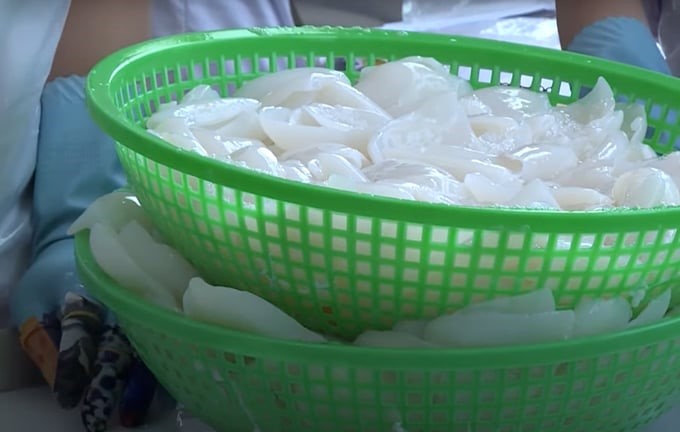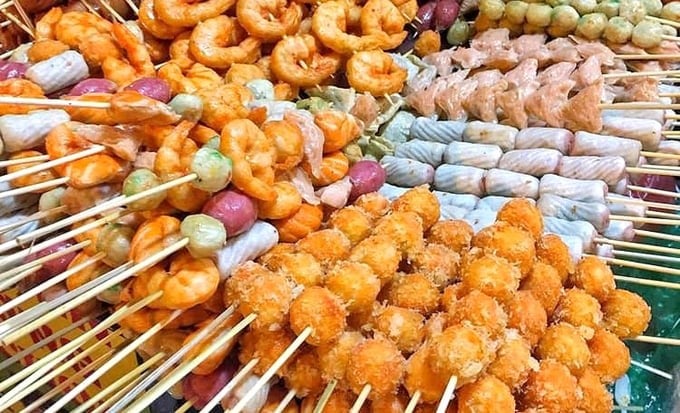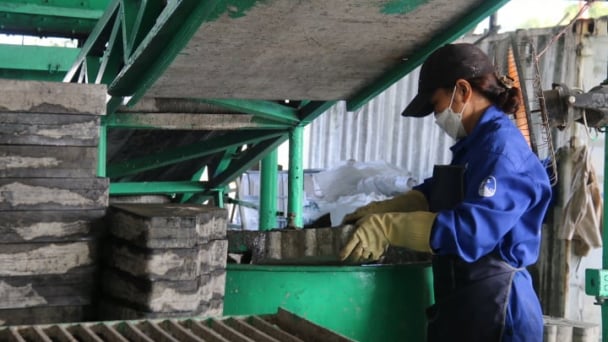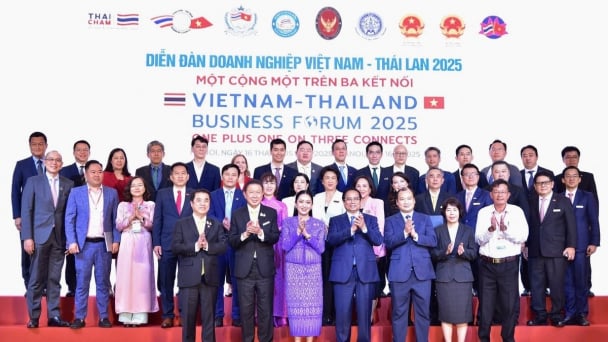May 19, 2025 | 15:59 GMT +7
May 19, 2025 | 15:59 GMT +7
Hotline: 0913.378.918
May 19, 2025 | 15:59 GMT +7
Hotline: 0913.378.918

Imported seafood raw materials are playing an important role in processing and exporting Vietnamese seafood. Photo: Son Trang.
Highland Dragon Co., Ltd. (Song Than 1 Industrial Park, Di An city, Binh Duong) is an enterprise specializing in processing seafood for export. To have enough seafood raw materials, Highland Dragon has imported seafood raw materials from many countries, including New Zealand.
Recently, a shipment of seafood raw materials that Highland Dragon purchased from New Zealand for processing and export to the EU encountered problems with the issuance of an H/C certificate for export to the EU. A representative of Highland Dragon said that the company had to ask for support from the New Zealand Embassy in Vietnam and New Zealand businesses exporting seafood raw materials to Vietnam to be granted an H/C certificate by Vietnamese authorities for this shipment. However, it still takes up to three weeks to resolve.
According to the Vietnam Association of Seafood Exporters and Producers (VASEP), some countries, such as New Zealand and the US, have had separate agreements with the EU on food safety control and the import and export of animals, animal products, and aquatic products between the two sides. Of which, New Zealand and the EU have their own Decision 97/132/EC on bilateral agreements, including the H/C form. In May 2022, New Zealand sent a document to the Ministry of Agriculture and Rural Development of Vietnam to notify the Ministry about this.
New Zealand‘s seafood shipments exported to the EU are all used and accompanied by an H/C certificate, according to the above agreement. Before 2024, many shipments of seafood raw materials that New Zealand exports to Vietnam also used this H/C form, and finished products produced from these batches of raw materials have all been appraised and issued H/C for export to the EU by units of the Department of National Agro-Forestry-Fishery Quality, Processing and Market Development Authority (NAFIQPM), Ministry of Agriculture of Rural Development (MARD).
However, since Decision 5523/QD-BNN-CCPT of MARD was issued on December 21, 2023, seafood shipments containing raw materials imported from New Zealand were not granted H/C certificates for export to the EU. This is causing difficulties for enterprises importing seafood raw materials from New Zealand for processing and export to the EU.
Faced with that situation, VASEP has proposed that, on the basis of mutual recognition and the practicality of the problem, MARD consider accepting H/C forms from countries that have separate agreements with the EU. At the same time, consider issuing H/C for finished product shipments containing imported seafood raw materials before the effective date of Decision 5523.
A number of other regulations related to the IUU are also causing great concern for enterprises importing seafood raw materials for processing and export to the EU.
For example, in Decree 37/2024/ND-CP, Article 70B stipulates: Do not mix seafood raw materials originating from imported exploitation with seafood raw materials originating from domestic exploitation into the same export shipment.
This regulation is causing concern for seafood export enterprises because it may be mandatory to combine many raw materials in one export shipment, even combining imported raw materials with domestically exploited raw materials in some shipments.
A representative of Binh Dinh Seafood JSC cited evidence that the company has shipments of seafood skewers exported to the EU. Each skewer must be mixed with many different types of fish, such as swordfish or mahi. To have enough types of fish like that for an export shipment of skewers, the company often has to use both domestically exploited fish sources and imported fish sources. Meanwhile, whether domestically exploited raw materials or imported raw materials, all need to have complete documents proving that they do not violate IUU regulations.

A seafood skewer includes many different types of raw materials. Photo: Son Trang.
According to Mr. Nguyen Hoai Nam, Deputy Secretary General of VASEP, the legal documents such as the Law on Fisheries 2017, Decree 26/2019/ND-CP, Decree 37/2024/ND-CP, and Decree 38/2024/ND-CP do not include a definition of "mixing." Therefore, there are many different understandings of mixing, whether it means a seafood product processed from many types of raw materials, including imported and domestically exploited raw materials, or a container of exported seafood, including some boxes of tuna, some boxes of swordfish, some boxes of octopus, etc. Therefore, without clarifying the concept of "mixing," it can easily lead to arbitrariness in handling by competent authorities due to different understandings of "mixing".
According to Ms. Nguyen Thi Thu Sac, Chairwoman of VASEP, saying "mixing" is not correct, but in fact this is a fraudulent act of swapping between imported seafood raw materials and domestically exploited seafood raw materials.
For shipments of imported seafood raw materials transported by container, Decree 37/ND-CP stipulates that, 48 hours before the shipment arrives at the port, organizations and individuals declare and send documents to the competent authority of the Ministry of Agriculture and Rural Development for verification to confirm the origin of sea raw materials that do not violate regulations on IUU.
Regarding this issue, some seafood businesses said that the time it takes for a ship to transport seafood raw materials from some ASEAN countries, such as Thailand, is less than 2 days. Only when the goods have been loaded onto the ship does the exporter begin to complete documents to send to the importer. The time it takes to complete documents and reach the importer will be much longer than the travel time of the ship carrying containers of seafood raw materials. Therefore, businesses suggest that instead of the regulation "48 hours before the shipment arrives at the port," the regulation should be "48 hours before the business carries out the customs clearance process for the shipment."
Translated by Thu Huyen

(VAN) The German Agricultural Society (DLG) explores the possibility of establishing a mechanization service center in Vietnam’s Mekong Delta to support farmers in accessing and utilizing advanced machinery.

(VAN) On May 16, the Department of Water Resources Management, in collaboration with the Food and Agriculture Organization of the United Nations (FAO), held a signing ceremony for the GEF-8 project document.

(VAN) Food safety, mechanization, vocational training, and market opening are key areas of cooperation expected between the Vietnamese Government and the Federal Republic of Germany.

(VAN) Deputy Minister Nguyen Quoc Tri also expressed his hope that Cuba will soon overcome its current challenges, attain food security, and further expand cooperation with Vietnam.

(VAN) The project contributes to enhancing the resilience of communities vulnerable to the impacts of climate change, with a primary focus on local women.

(VAN) Green materials help save energy and resources. However, after more than 10 years, Vietnam has only developed over 200 green buildings with more than 6 million square meters of floor space.

(VAN) Vietnam - Thailand Business Forum 2025: One plus one on three connects, marking a milestone in the comprehensive strategic partnership between the two nations.